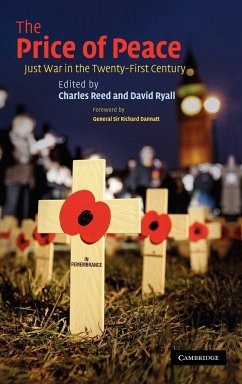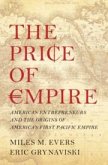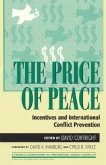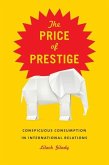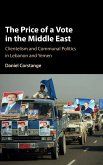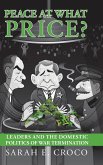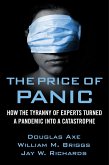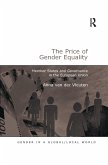A re-examination of the Just War tradition in the context of the twenty-first century.
Lively political and public debates on war and morality have been a feature of the post-Cold War world. The Price of Peace argues that a re-examination of the just war tradition is therefore required. The authors suggest that despite fluctuations and transformations in international politics, the just war tradition continues to be relevant. However they argue that it needs to be reworked to respond to the new challenges to international security represented by the end of the Cold War and the impact of terrorism. With an interdisciplinary and transatlantic approach, this volume provides a dialogue between theological, political, military and public actors. By articulating what a reconstituted just war tradition might mean in practice, it also aims to assist policy-makers and citizens in dealing with the ethical dilemmas of war.
Review quote:
'Between moral certainty and ruthless cynicism lies the practical wisdom of the just war tradition. In the hands of its wise editors and expert contributors, this volume gives access to the full range of the tradition's discipline. It is essential reading for anyone who seeks to understand the duties and restraints that separate the humane from the barbarous - particularly in the extreme aspect of the human condition we are now experiencing as war in the 21st century.' Joel H. Rosenthal, President, Carnegie Council for Ethics in International Affairs
'This excellent book should be read by the many who comment on the rights and wrongs of today's numerous conflicts. In particular it should be read by all involved with initiating or directing military operations and by those commanding forces engaged on operations. Drawing on the thoughts of theologians, academics and practitioners, its chapters clearly and logically provide the background of reason and morality necessary to guide decision within a sound ethical compass. With the change in the nature of conflict the need for this understanding is most important, since with change comes the need to apply the enduring principles in new circumstances - principles that if applied serve to restrain the tendency for the awfulness of war to expose the beast in man.' General Sir Rupert Smith KCB DSO OBE QGM, Former Deputy Supreme Commander, Allied Powers Europe
Table of contents:
Foreword Richard Dannatt; 1. Introduction Charles Reed and David Ryall; Part I. A Framework for Ethical Decision Making: State and Civil Society-Based Approaches: 2. The development of just war thinking in the post-Cold War world: an American perspective George Weigel; 3. Is there a European approach to war? William Wallace; 4. Between development and doubt: the recent career of just war doctrine in British churches Nigel Biggar; 5. Just war thinking in recent American religious debate over military force James Turner Johnson; Part II. Responding Justly to New Threats: 6. Humanitarian intervention David Fisher; 7. Terrorism Jean Bethke Elshtain; 8. Rogue regimes, WMD and hyper-terrorism: Augustine and Aquinas meet Chemical Ali Paul Schulte; 9. Moral versus legal imperatives Frank Berman; Part III. Fighting Wars Justly: 10. The ethics of 'effects-based' warfare: the crowding out of jus in bello? Paul Cornish; 11. The just conduct of war against radical Islamic terror and insurgencies Terrence K. Kelly; Part IV. Securing Peace Justly: 12. Justice after war and the international common good John Langan; 13. Conditions for jus in pace in the face of the future Gwyn Prins; 14. From just war to just peace Mary Kaldor; Part V. Concluding Reflections: 15. A US political perspective Michael O. Wheeler; 16. A British political perspective Michael Quinlan; 17. An American military ethicist's perspective Shannon E. French; 18. A British theological perspective Richard Harries.
Hinweis: Dieser Artikel kann nur an eine deutsche Lieferadresse ausgeliefert werden.
Lively political and public debates on war and morality have been a feature of the post-Cold War world. The Price of Peace argues that a re-examination of the just war tradition is therefore required. The authors suggest that despite fluctuations and transformations in international politics, the just war tradition continues to be relevant. However they argue that it needs to be reworked to respond to the new challenges to international security represented by the end of the Cold War and the impact of terrorism. With an interdisciplinary and transatlantic approach, this volume provides a dialogue between theological, political, military and public actors. By articulating what a reconstituted just war tradition might mean in practice, it also aims to assist policy-makers and citizens in dealing with the ethical dilemmas of war.
Review quote:
'Between moral certainty and ruthless cynicism lies the practical wisdom of the just war tradition. In the hands of its wise editors and expert contributors, this volume gives access to the full range of the tradition's discipline. It is essential reading for anyone who seeks to understand the duties and restraints that separate the humane from the barbarous - particularly in the extreme aspect of the human condition we are now experiencing as war in the 21st century.' Joel H. Rosenthal, President, Carnegie Council for Ethics in International Affairs
'This excellent book should be read by the many who comment on the rights and wrongs of today's numerous conflicts. In particular it should be read by all involved with initiating or directing military operations and by those commanding forces engaged on operations. Drawing on the thoughts of theologians, academics and practitioners, its chapters clearly and logically provide the background of reason and morality necessary to guide decision within a sound ethical compass. With the change in the nature of conflict the need for this understanding is most important, since with change comes the need to apply the enduring principles in new circumstances - principles that if applied serve to restrain the tendency for the awfulness of war to expose the beast in man.' General Sir Rupert Smith KCB DSO OBE QGM, Former Deputy Supreme Commander, Allied Powers Europe
Table of contents:
Foreword Richard Dannatt; 1. Introduction Charles Reed and David Ryall; Part I. A Framework for Ethical Decision Making: State and Civil Society-Based Approaches: 2. The development of just war thinking in the post-Cold War world: an American perspective George Weigel; 3. Is there a European approach to war? William Wallace; 4. Between development and doubt: the recent career of just war doctrine in British churches Nigel Biggar; 5. Just war thinking in recent American religious debate over military force James Turner Johnson; Part II. Responding Justly to New Threats: 6. Humanitarian intervention David Fisher; 7. Terrorism Jean Bethke Elshtain; 8. Rogue regimes, WMD and hyper-terrorism: Augustine and Aquinas meet Chemical Ali Paul Schulte; 9. Moral versus legal imperatives Frank Berman; Part III. Fighting Wars Justly: 10. The ethics of 'effects-based' warfare: the crowding out of jus in bello? Paul Cornish; 11. The just conduct of war against radical Islamic terror and insurgencies Terrence K. Kelly; Part IV. Securing Peace Justly: 12. Justice after war and the international common good John Langan; 13. Conditions for jus in pace in the face of the future Gwyn Prins; 14. From just war to just peace Mary Kaldor; Part V. Concluding Reflections: 15. A US political perspective Michael O. Wheeler; 16. A British political perspective Michael Quinlan; 17. An American military ethicist's perspective Shannon E. French; 18. A British theological perspective Richard Harries.
Hinweis: Dieser Artikel kann nur an eine deutsche Lieferadresse ausgeliefert werden.
'This excellent book should be read by the many who comment on the rights and wrongs of today’s numerous conflicts. In particular it should be read by all involved with initiating or directing military operations and by those commanding forces engaged on operations. Drawing on the thoughts of theologians, academics and practitioners, its chapters clearly and logically provide the background of reason and morality necessary to guide decision within a sound ethical compass. With the change in the nature of conflict the need for this understanding is most important, since with change comes the need to apply the enduring principles in new circumstances - principles that if applied serve to restrain the tendency for the awfulness of war to expose the beast in man.' General Sir Rupert Smith KCB DSO OBE QGM, Former Deputy Supreme Commander, Allied Powers Europe

